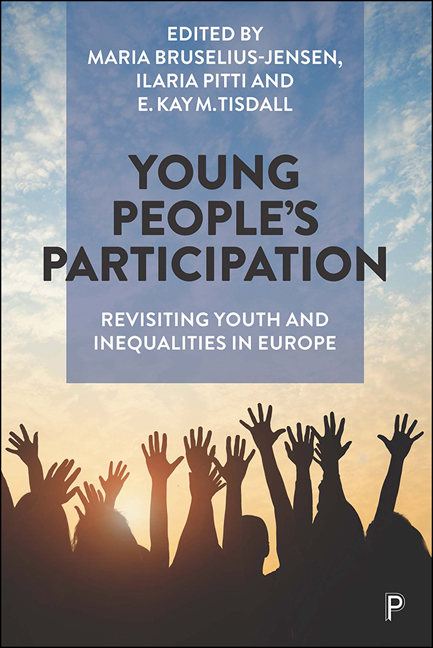Book contents
- Frontmatter
- Contents
- List of figures and tables
- Notes on contributors
- Acknowledgements
- 1 Revisiting young people's participation: an introduction
- PART I Young people's experiences of participation and engagement
- PART II Current state and conditions for young people’s participation: critiques and trends
- PART III Broadening participation: young people's own approaches to participation
- PART IV New opportunities for young people's participation: facilitating new forms of youth participation
- Index
5 - Bounded agency and social participation: how socioeconomic situation and experiences influence young people's way of engaging in society
Published online by Cambridge University Press: 18 December 2021
- Frontmatter
- Contents
- List of figures and tables
- Notes on contributors
- Acknowledgements
- 1 Revisiting young people's participation: an introduction
- PART I Young people's experiences of participation and engagement
- PART II Current state and conditions for young people’s participation: critiques and trends
- PART III Broadening participation: young people's own approaches to participation
- PART IV New opportunities for young people's participation: facilitating new forms of youth participation
- Index
Summary
This chapter presents data from the PROMISE Youth Survey gathered as part of PROMISE, a Horizon 2020 research project addressing the social participation of young people in conflict with authority. Building on the work of Evans (2002), Ekman and Amna (2012) and Munford and Sanders (2015), we develop the concept of social participation to provide a broader, context-based definition that allows us to explore a diverse range of youth activities. Our analysis explores the diverse forms of social participation and the factors that can influence young people´s agency and ability to engage. We highlight the extent to which young people´s agency is bound by their experience and current social context, and assess under which circumstances those experiences can become an enabler of engagement.
Key findings
• Social exclusion, which is commonly expected to be a key barrier towards participation, can be a trigger for activism, everyday engagement and helping behaviours.
• The need to avoid deterministic logics in the study of youth participation emerges from the nuanced effects shown by factors often uncritically assumed as barriers and enablers of engagement.
• Factors that increase personal efficacy (education, social trust and local connections) contribute towards young people being able to enact their agency and turn negative life experiences into actions that benefit themselves and their communities.
Introduction
Young people participate in society in different ways and to different extents. Their participation (or lack of it) in collective and private settings, and in political and social activities, is influenced by multiple factors including their own life experience. This chapter explores various forms of young people's social participation, and the factors that can influence their ability to engage. We present the findings of the PROMISE survey, conducted as part of the wider PROMISE research project, Promoting Youth Involvement and Social Engagement, a research project funded by the European Union, which ran from May 2016 to April 2019.1 Its aim was to explore young people's role in shaping society and to assess the potential, across Europe, for youth involvement in positive social action and sustainable change. The project brought together 12 collaborating centres in Croatia, Estonia, Finland, Germany, Italy, Portugal, Slovakia, Spain, the Russian Federation and the UK.
- Type
- Chapter
- Information
- Young People's ParticipationRevisiting Youth and Inequalities in Europe, pp. 53 - 76Publisher: Bristol University PressPrint publication year: 2021

